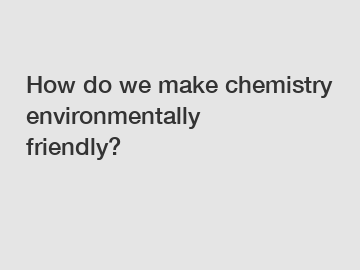How do we make chemistry environmentally friendly?
How do we make chemistry environmentally friendly?
Chemistry is a fundamental branch of science that plays a crucial role in numerous industries and advancements. However, the traditional practices of chemistry often involve harmful substances and processes that pose serious threats to our environment and human health. As the need for sustainable practices grows, it becomes imperative to find ways to make chemistry more environmentally friendly. By implementing innovative technologies, adopting green chemistry principles, and promoting responsible waste management, we can work towards a cleaner and greener future.
Green Technologies: Advancing Towards Sustainability.

The use of green technologies is a significant step in making chemistry more environmentally friendly. These technologies focus on reducing or eliminating the use of hazardous substances, minimizing waste generation, and utilizing renewable resources. For example, researchers are developing cleaner alternatives to conventional solvents that are non-toxic and less harmful to the environment. New technologies such as supercritical fluid extraction and ionic liquids offer promising alternatives that can replace traditional organic solvents.
Green Chemistry Principles: Driving Change.
Green chemistry principles serve as a roadmap for designing sustainable chemical processes. These principles focus on preventing pollution at the source, designing less hazardous chemicals, and improving energy efficiency. One of the key aspects of green chemistry is designing catalysts that increase reaction rates while minimizing the use of toxic materials. By optimizing reaction conditions and employing catalytic processes, chemists can reduce the energy consumption and environmental impact of chemical reactions.
Responsible Waste Management: Minimizing Environmental Footprint.
Chemical waste is a major concern when it comes to the environmental impact of chemistry. To make chemistry environmentally friendly, it is crucial to implement responsible waste management practices. This includes recycling and reusing materials whenever possible, treating hazardous waste appropriately, and reducing the overall waste generated. By adopting these practices, the environmental footprint of chemistry can be significantly reduced.
Conclusion.
In conclusion, making chemistry environmentally friendly requires a concerted effort to incorporate innovative technologies, adhere to green chemistry principles, and implement responsible waste management. By doing so, we can minimize the adverse environmental impact of chemistry and promote sustainable practices. It is essential for industries, researchers, and policymakers to collaborate and strive towards greener solutions. Together, we can create a world where chemistry coexists harmoniously with the environment, ensuring a sustainable future for generations to come.
If you require more information or need assistance with implementing environmentally friendly practices in chemistry, please contact us. We are here to help and guide you towards a greener and sustainable approach.
The company is the world’s best S-BPDA, lithium iron phosphate cathode material manufacturer, iron phosphate for sale supplier. We are your one-stop shop for all needs. Our staff are highly-specialized and will help you find the product you need.
182
0
0


Comments
All Comments (0)